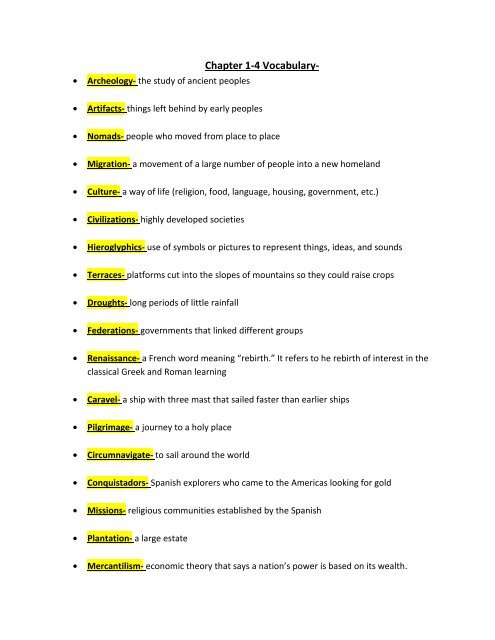Causes and Effects of European Exploration: Causes- Effects-
Causes and Effects of European Exploration: Causes- Effects- Causes and Effects of European Exploration: Causes- Effects-
• Tea Act- The British East India Company sells tea to colonist• Coercive Acts- Also known as the Intolerable Acts, were laws passed by King George, tocontrol the colonists with very harsh punishments• Quebec Act- Set up a permanent government for Quebec and granted religiousfreedom to French Catholics
• Archeology- the study of ancient peoplesChapter 1-4 Vocabulary-• Artifacts- things left behind by early peoples• Nomads- people who moved from place to place• Migration- a movement of a large number of people into a new homeland• Culture- a way of life (religion, food, language, housing, government, etc.)• Civilizations- highly developed societies• Hieroglyphics- use of symbols or pictures to represent things, ideas, and sounds• Terraces- platforms cut into the slopes of mountains so they could raise crops• Droughts- long periods of little rainfall• Federations- governments that linked different groups• Renaissance- a French word meaning “rebirth.” It refers to he rebirth of interest in theclassical Greek and Roman learning• Caravel- a ship with three mast that sailed faster than earlier ships• Pilgrimage- a journey to a holy place• Circumnavigate- to sail around the world• Conquistadors- Spanish explorers who came to the Americas looking for gold• Missions- religious communities established by the Spanish• Plantation- a large estate• Mercantilism- economic theory that says a nation’s power is based on its wealth.
- Page 2 and 3: The Middle Passage- The inhuman par
- Page 7 and 8: • Persecuted- to be treated harsh
- Page 9 and 10: Chapter 5 Vocabulary:• Boston Mas
- Page 11 and 12: • General William Howe- British c
- Page 13 and 14: The Revolutionary War consisted of
- Page 15 and 16: Review:Page 158 (Questions 10-18)10
- Page 17 and 18: Review:Page 188 (Questions 5, 6, 8,
- Page 19 and 20: Guided Reading Activity:The Contine
- Page 21: Economic Development in the Colonie
• Archeology- the study <strong>of</strong> ancient peoplesChapter 1-4 Vocabulary-• Artifacts- things left behind by early peoples• Nomads- people who moved from place to place• Migration- a movement <strong>of</strong> a large number <strong>of</strong> people into a new homel<strong>and</strong>• Culture- a way <strong>of</strong> life (religion, food, language, housing, government, etc.)• Civilizations- highly developed societies• Hieroglyphics- use <strong>of</strong> symbols or pictures to represent things, ideas, <strong>and</strong> sounds• Terraces- platforms cut into the slopes <strong>of</strong> mountains so they could raise crops• Droughts- long periods <strong>of</strong> little rainfall• Federations- governments that linked different groups• Renaissance- a French word meaning “rebirth.” It refers to he rebirth <strong>of</strong> interest in theclassical Greek <strong>and</strong> Roman learning• Caravel- a ship with three mast that sailed faster than earlier ships• Pilgrimage- a journey to a holy place• Circumnavigate- to sail around the world• Conquistadors- Spanish explorers who came to the Americas looking for gold• Missions- religious communities established by the Spanish• Plantation- a large estate• Mercantilism- economic theory that says a nation’s power is based on its wealth.



